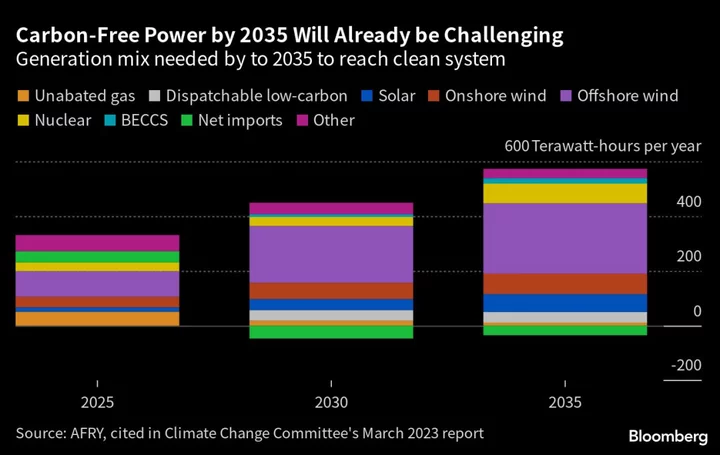The UK opposition Labour Party watered down its £140 billion ($176 billion) flagship green energy plan days before it was due to be presented as concern that it was too expensive and ambitious created mounting tensions among senior figures.
The party caved in to internal pressure on the five-year spending promise and now plans to “ramp up” to £28 billion per annum, rather than hit that figure from the beginning if it wins power.
Labour, well ahead in recent polls, is hoping a strong climate policy will help it win votes at the next election, expected in 2024. The policy was seen as one of the few meaty ideas by Labour leader Keir Starmer and crucial as a response to the US green subsidies in President Joe Biden’s Inflation Reduction Act.
But officials involved in Labour’s plans for larger spending departments — such as health and education — were worried there would be less money for those key areas because of the green spending, people familiar with the matter said.
Announcing the more fiscally cautious strategy, Shadow Chancellor Rachel Reeves blamed the Conservative government for damaging the economy since the spending was first mooted in 2021. The rowback is effectively a defensive move against potential attacks for out-of-control spending, an accusation often leveled at Labour. But the internal political tensions could damage credibility at a time that Labour is trying to sell itself as a stable force in politics.
According to a person familiar with the matter, the change was months in the making, amid broader discussions about interest rates and the deteriorating fiscal position. The goal is to ensure that every spending policy is paid as Labour prepares for government, the person said. Starmer will announce the green plan later this month, two people familiar with the matter said.
Ed Miliband, Labour’s spokesman on climate change, alluded to the political tension over spending in a tweet on Friday.
The environment could be a key campaign issue in the next election — along with health and the economy — pitting the push for stronger climate action against arguments about the high cost of the energy transition.
“No question – green policies are extremely popular and opinion polls have shown there is strong support for them in marginal constituencies and in the red or blue wall regions,” said Ed Matthew, campaigns director at climate think tank E3G. “People want a green transition and they want the UK to stay industrially competitive.”
The cost issue will be forefront in voter’s minds after the inflation surge and cost-of-living crisis sparked in part by a huge spike in energy bills last year.
In response, Labour is tapping into the idea, put forward by many in the energy sector, that reducing use of fossil fuels by boosting renewables is the best way to reduce reliance on expensive imports.
Promising to lower energy bills is likely to be popular with voters. Wholesale costs have dropped dramatically but there’s a lag to the domestic market and the removal of government support measures have distorted the decline for household bills.
Read More on UK Politics:
- Labour Is on Course for UK Election Landslide, Poll Shows
- Rising UK Rates Open £9 Billion Hole in Tory and Labour Plans
- Starmer Vows to Boost UK Steelmaking as He Makes Pitch for Power
Labour’s plans also promise a clean electricity grid by 2030, five years sooner than the Conservatives, a target that industry says is “impossible.”
But Starmer has also been forced to reassure unions concerned about job losses from the green transition, particularly related to restrictions on North Sea oil and gas drilling. Both the GMB and Unite unions that spoke out against the policy this week are affiliates and financial backers of the Labour Party.
The Conservatives have pledged to make electricity carbon-free by 2035, a goal that will require new generation to be built quickly to replace gas-fired power that provides more than a third of supply now.
Even that will be difficult without major changes to the long planning-permission process and speeding up grid connections, according to the Climate Change Committee that advises the government.
“2030, even with the best will in the world, I would say is impossible,” said Phil Thompson, chief executive of clean energy developer Balance Power Group Ltd. “We have to be super ambitious because the planet isn’t getting any cooler and it’s a case of shoot for the stars, but I think technically it’s not achievable unless someone has got a magic wand.”
--With assistance from Olivia Rudgard, Alex Wickham and William Mathis.
(Updates with timing of green announcement in sixth paragraph)
Author: Rachel Morison, Alex Wickham and Joe Mayes

